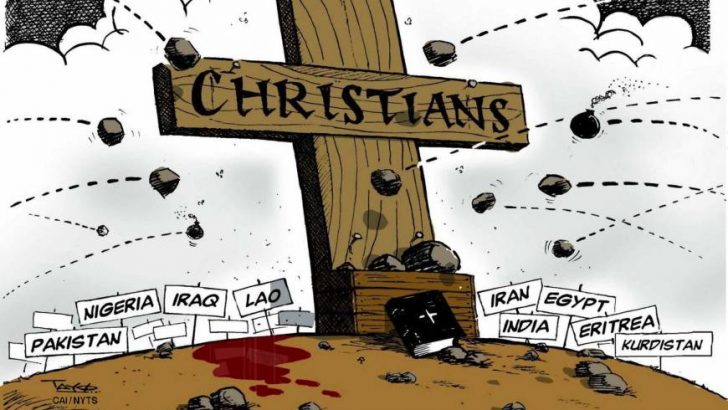Letter of the week
The persecution of those with Christian values
Dear Editor, I have written in the past regarding my deep appreciation of The Irish Catholic newspaper, and now I write to express that same appreciation of all the great writers who contribute to this paper and, above all, to some new contributors, especially Martina Purdy. Her articles are so straightforward, enlightened and courageously sharing the truth regarding falsehood, gender ideology and, this past edition, her article on abortion. It is so obvious that she is a lady of strong convictions and much courage. I am grateful that she finds an outlet for her wisdom and knowledge in your paper, and readers like myself feel enriched and nourished by her insights and sharing. She is certainly doing a good job on passing on Christian values and teaching.
Another programme that gives voice to strong Catholic, Christian teachings is the Cursillo movement. At a Cursillo weekend, I once heard a Catholic laywoman’s talk on the role of laity in the Church and the world, and its one sentence from that talk that has stayed with me — her words were “if we don’t see the world as moving away from God, we are blind”.
The mission is to proclaim the good news of The Gospel to a world that desperately needs enlightenment and help. That mission is more difficult today and becoming more and more difficult in a very secular world where Christians are persecuted for taking their faith seriously and endeavouring to live by its demands. Serious Christians are persecuted not only by those outside the Faith but by assimilated Christians as well. The latter are welcomed by the worldly, since their Faith does not impinge upon the world’s conduct or values.
Pope Francis is begging world and Church leaders to learn dialogue where openness, sincerity and honesty can be respected. The Pope has also warned that the persecution of those with Christian values can lead to the privatising of religion and hinder all public expression of these same values. I pray we don’t silence the convictions of those with strong biblical beliefs. I also pray that they can share these convictions with love, for TLC is needed — ie. truth with love makes community.
Yours etc.,
Sr Susan Evangelist
Ballyshannon, Co. Donegal
Baptism is the greatest sacrament
Dear Editor, It is theologically and scripturally wrong to deny any Catholic Holy Communion because of any perceived sin by the priest.
According to the Gospel of St John, Our Lord gave Holy Communion to Judas Iscariot at the Last Supper even though He knew that Judas had decided to betray Him. He disclosed this to all the Apostles. Betraying Our Lord and assisting in His judicial murder must be the greatest sin of all time.
I would disagree with Mr David Quinn that Holy Communion is the greatest sacrament. I believe that Baptism is – the imprinting of an indelible character on the soul and becoming part of the Mystical Body of Christ.
Yours etc.,
Frank MacGabhann
Skerries, Co. Dublin
Every baby and mother must be valued
Dear Editor, The news that 10,033 abortions were carried out last year should worry and sadden everyone in Irish society. Lack of supports for childcare and the rise in the cost of living are significant factors in this catastrophic rise. We have to do more as a society to prevent women from feeling the despair that leads to abortion in such massive numbers. Every life has value, every mother and baby should be valued and we should be able to show this by supporting women and providing them with the necessities that they require for their children.
Yours faithfully
Anna O’ Donoghue
Mullahoran, Co Cavan
Consequences of receiving Communion unworthily
Dear Editor, David Quinn’s article on the Cloyne Communion controversy [The Irish Catholic – July 18, 2024] is welcome for the additional background it provides. But a major deficiency is that it doesn’t address the pink elephant in the room: the grave consequences of unworthy/sacrilegious Communion.
Our Catholic belief is based on 1 Corinthians 11:27ff: “Whoever, therefore, eats the bread or drinks the cup of the Lord in an unworthy manner will be answerable for the body and blood of the Lord. Examine yourselves, and only then eat of the bread and drink of the cup. For all who eat and drink without discerning the body, eat and drink judgment against themselves.” (v27-29) This deserves a serious reckoning!
In his Eucharistic encyclical letter Ecclesia de Eucharistia (2003) St John Paul II restated the traditional teaching: “I therefore desire to reaffirm that in the Church there remains in force, now and in the future, the rule by which the Council of Trent gave concrete expression to the Apostle Paul’s stern warning [1 Cor 11:27ff] when it affirmed that, in order to receive the Eucharist in a worthy manner, ‘one must first confess one’s sins, when one is aware of mortal sin’” (#36).
I’d say that Fr Burke’s primary and pastoral intention was to save Colm Burke the consequences of receiving Communion unworthily.
Yours etc.
A.P. Breen
Bronx, New York, USA












